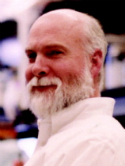Dysregulated expression of androgen-responsive and nonresponsive genes in the androgen-independent prostate cancer xenograft model CWR22-R Journal Article
| Authors: | Amler, L. C.; Agus, D. B.; Leduc, C.; Sapinoso, M. L.; Fox, W. D.; Kern, S.; Lee, D.; Wang, V.; Leysens, M.; Higgins, B.; Martin, J.; Gerald, W.; Dracopoli, N.; Cordon-Cardo, C.; Scher, H. I.; Hampton, G. M. |
| Article Title: | Dysregulated expression of androgen-responsive and nonresponsive genes in the androgen-independent prostate cancer xenograft model CWR22-R |
| Abstract: | Treatment of metastatic prostate cancer with androgen-ablation often elicits dramatic tumor regressions, but the response is rarely complete, making clinical recurrence inevitable with time, To gain insight into therapy-related progression, changes in gene expression that occurred following androgen-deprivation of an androgen-dependent prostate tumor xenograft, CWR22, and the emergence of an androgen-independent tumor, CWR22-R, were monitored using microarray analysis. Androgen-deprivation resulted in growth arrest of CWR22 cells, as evidenced by decreased expression of genes encoding cell cycle components and basal cell metabolism, respiration and transcription, and the induced expression of putative negative regulatory genes that may act to sustain cells in a nonproliferative state. Evolution of androgen-independent growth and proliferation, represented by CWR22-R, was associated with a reentry into active cell cycle and the up-regulation of several genes that were expressed at low levels or absent in the androgen-dependent tumor. Androgen repletion to mice bearing androgen-independent CWR22-R tumors induced, augmented, or repressed the expression of a number of genes. Expression of two of these genes, the calcium-binding protein S100P and the FK-506-binding protein FKBP51, was decreased following androgen-deprivation, subsequently reexpressed in CWR22-Rat levels comparable with CWR22, and elevated further upon treatment with androgens. The dysregulated behavior of these genes is analogous to other androgen-dependent genes, e.g prostate-specific antigen and human kallikrein 2, which are commonly reexpressed in androgen-independent disease in the absence of androgens. Other androgen-responsive genes whose expression decreased during androgen-deprivation and whose expression remained decreased in CWR22 were also identified in CWR22-R, These results imply that evolution to androgen-independence is due, in part, to reactivation of the androgen-response pathway in the absence of androgens, but that this reactivation is probably incomplete. |
| Keywords: | carcinoma; in-vivo; family; cells; tumor-suppressor gene; growth; cloning; member; complementary-dna; beta-stimulated clone-22 |
| Journal Title: | Cancer Research |
| Volume: | 60 |
| Issue: | 21 |
| ISSN: | 0008-5472 |
| Publisher: | American Association for Cancer Research |
| Date Published: | 2000-11-01 |
| Start Page: | 6134 |
| End Page: | 6141 |
| Language: | English |
| ACCESSION: | WOS:000165230300037 |
| PROVIDER: | wos |
| PUBMED: | 11085537 |
| Notes: | Article -- Source: Wos |
Citation Impact
Related MSK Work





